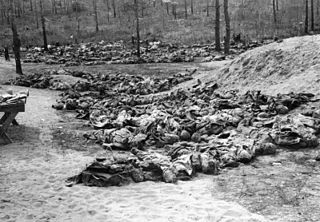Soviet repressions of Polish citizens (1939–46)

Bodies of Polish prisoners-of-war by the mass graves, awaiting forensic examination, 30 April 1943
|
|
| Soviet invasion of Poland | |
|---|---|
|
In the aftermath of the German and Soviet invasion of Poland, which took place in September 1939, the territory of Poland was divided in half between Nazi Germany and the Soviet Union. The Soviets had ceased to recognise the Polish state at the start of the invasion. Both regimes were hostile to the Second Polish Republic as much as to the Polish people and their culture, thus aiming at their destruction. Since 1939 German and Soviet officials coordinated their Poland-related policies and repressive actions. For nearly two years following the invasion, the two occupiers continued to discuss bilateral plans for dealing with the Polish resistance during Gestapo-NKVD Conferences until Germany's Operation Barbarossa against its own ally, the Soviet Union, in June 1941.
By the time German-Soviet alliance was broken and the new war erupted, the Soviets arrested and imprisoned already about 500,000 Polish nationals in the Kresy macroregion including civic officials, military personnel and all other "enemies of the people" such as clergy and the Polish educators: about one in ten of all adult males. There is some controversy as to whether the Soviet Union's policies were harsher than those of Nazi Germany until that time.
Large groups of pre-war Polish citizens, notably Jews and, to a lesser extent, the Ukrainian peasants, perceived the Soviet entry into Poland as an opportunity to take part in communist activities outside of their traditional ethnic or cultural environment. Their enthusiasm faded with time, as it became clear that the Soviet repressions were aimed at all groups equally, regardless of their ideological stance. It is estimated that at least 150,000 Polish citizens died during the Soviet occupation. It is a conservative estimate confirmed by analysis, while the unconfirmed number proposed by Prof. Czesław Łuczak reaches 500,000.
...
Wikipedia
